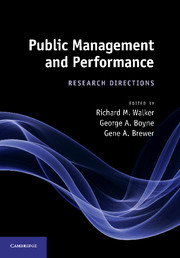Book contents
- Frontmatter
- Contents
- List of figures
- List of tables
- Notes on contributors
- 1 Introduction
- 2 Extending goal ambiguity research in government: from organizational goal ambiguity to programme goal ambiguity
- 3 Budgets and financial management
- 4 Organizational structure and public service performance
- 5 Red tape: the bane of public organizations?
- 6 Managerial networking, managing the environment, and programme performance: a summary of findings and an agenda
- 7 Public service motivation and performance
- 8 Organizational diversity and public service performance
- 9 Performance management: does it work?
- 10 Strategy: which strategic stances matter?
- 11 Methods
- 12 Conclusion: enriching the field
- Index
- References
12 - Conclusion: enriching the field
Published online by Cambridge University Press: 05 July 2014
- Frontmatter
- Contents
- List of figures
- List of tables
- Notes on contributors
- 1 Introduction
- 2 Extending goal ambiguity research in government: from organizational goal ambiguity to programme goal ambiguity
- 3 Budgets and financial management
- 4 Organizational structure and public service performance
- 5 Red tape: the bane of public organizations?
- 6 Managerial networking, managing the environment, and programme performance: a summary of findings and an agenda
- 7 Public service motivation and performance
- 8 Organizational diversity and public service performance
- 9 Performance management: does it work?
- 10 Strategy: which strategic stances matter?
- 11 Methods
- 12 Conclusion: enriching the field
- Index
- References
Summary
Introduction
The impact of management on the performance of public organizations has become a major question for researchers in the last two decades. Although this issue has been debated extensively in the past, it is only more recently that it has been addressed through rigorous empirical studies that draw upon theories of organizational and managerial behaviour. In addition, only since the late 1980s have concepts and measures of performance been prominent on the academic agenda; somewhat belatedly, policy-makers and managers might argue, because these are the issues that dominate their working lives. This interest in performance has coincided with, and been reinforced by, the widespread availability of data on the efficiency and effectiveness of public organizations as a consequence of the adoption of New Public Management (NPM) reforms. The coalescence of theoretical interest in management and performance with the availability of data that allow propositions to be tested has led to a surge of projects and papers on the topic. In our view this focus on performance is entirely appropriate, because traditional research on public management has concentrated too much on inputs, activities, structures and processes, and neglected what public organizations actually achieve and the determinants of success or failure. In sum, research on management and performance is not simply an academic fad, but is increasingly the topic that defines public management as an applied social science that seeks to contribute to both theory and practice (Andrews and Boyne 2010).
- Type
- Chapter
- Information
- Public Management and PerformanceResearch Directions, pp. 268 - 281Publisher: Cambridge University PressPrint publication year: 2010
References
- 6
- Cited by



